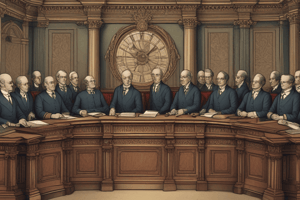Podcast
Questions and Answers
What influenced the formation of the English Parliament after the Magna Carta?
What influenced the formation of the English Parliament after the Magna Carta?
- The establishment of the House of Lords and Commons
- The introduction of representative democracy
- The requirement for kings to gain approval from noblemen for important decisions (correct)
- The king's need for advice from the church leaders
What was the original purpose of the English Parliament?
What was the original purpose of the English Parliament?
- To create a legislative body independent of the monarchy
- To serve as a platform for the king to discuss issues with his council (correct)
- To oversee the financial affairs of the kingdom
- To represent the common people in government
What significant change occurred in the composition of Parliament by the mid-14th century?
What significant change occurred in the composition of Parliament by the mid-14th century?
- Noblemen and bishops started gathering separately into the House of Lords (correct)
- All representatives were required to be commoners
- Parliament became entirely controlled by the monarchy
- The introduction of a third house to represent merchants
How did the power of the House of Commons increase over time?
How did the power of the House of Commons increase over time?
What effect did the Glorious Revolution have on the English Parliament?
What effect did the Glorious Revolution have on the English Parliament?
Flashcards
What is the origin of the English Parliament?
What is the origin of the English Parliament?
The English Parliament is a medieval institution that emerged in the 13th century, originating from the French word 'parler', meaning 'to speak'.
What was the role of the English Parliament in its early stages?
What was the role of the English Parliament in its early stages?
Initially, the Parliament served as a platform for the king to discuss matters of national importance with his council, composed of influential noblemen and church leaders.
How did Magna Carta influence the English Parliament?
How did Magna Carta influence the English Parliament?
The Magna Carta (1215) established the principle that the king required approval from powerful noblemen for significant decisions, particularly those related to taxation and finances.
What major change occurred in the English Parliament in 1295?
What major change occurred in the English Parliament in 1295?
Signup and view all the flashcards
How did the English Parliament structure itself over time?
How did the English Parliament structure itself over time?
Signup and view all the flashcards
Study Notes
Origins of the English Parliament
- English Parliament is an ancient institution, starting in the 13th century.
- The name derives from the French word "parler" meaning "to speak."
- Initially, it was a council of the king and royal advisors (powerful nobles and church leaders).
- Following Magna Carta (1215), kings needed approval from influential nobles, especially for raising taxes.
- This led to the formation of Parliament.
Development of Parliament
- 1295: King Edward I invited county and town representatives to Parliament, establishing a precedent.
- By the mid-14th century, the nobles and bishops formed the House of Lords, while commoners formed the House of Commons.
- The two houses became standard by the 16th century.
- By the 16th century, parliamentary approval was customary for the monarch's decisions, but the monarch wasn't obligated to consult Parliament for issues.
- The early 17th century saw mounting expectations for Parliament (especially the Commons) in political decisions.
- Conflict arose when King Charles I ignored Parliament, highlighting the growing tension.
- The House of Commons gained increasing power due to its financial influence.
- The Glorious Revolution and the development of constitutional monarchy finalized this evolution.
Studying That Suits You
Use AI to generate personalized quizzes and flashcards to suit your learning preferences.




